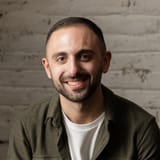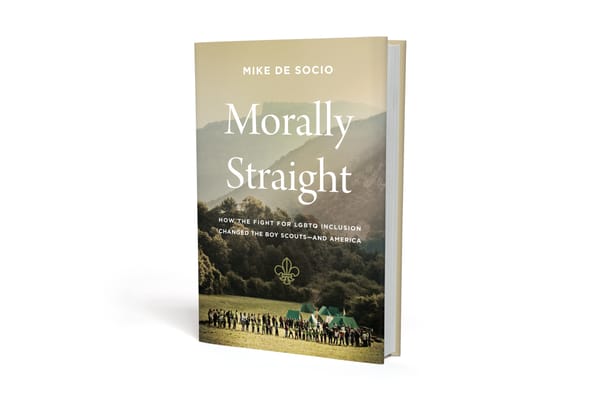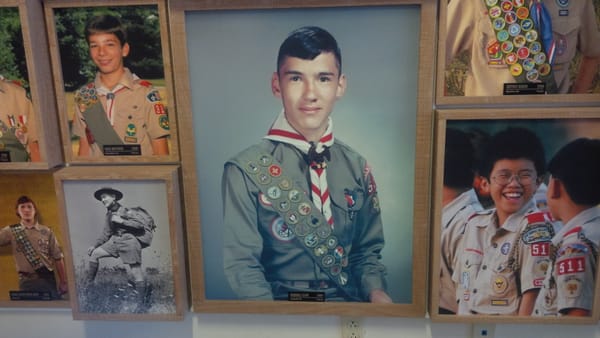How a Boy Scout council in Texas is making progress on LGBTQ+ inclusion
Despite the area’s conservative political reputation, Chris Hoffman has led an unassuming, yet highly effective set of LGBTQ+ inclusion efforts.
It all started with a Facebook group.
Chris Hoffman, a volunteer with the Longhorn Council in north Texas, was interested in taking more action around LGBTQ+ inclusion in his area. He was a member of the LGBTQ+ Scouts and Allies Facebook group, and noticed that his scout executive, Wendy Shaw, was a member, too.
Hoffman figured Shaw would be receptive to some programming on the local level, and the two soon started formulating what would become the LGBTQ+ committee for Longhorn Council, which is based in Fort Worth, Texas.
Fast forward a year or so, and Hoffman posted in the very same group to brag about the progress he’d made. That’s when the council’s efforts caught my eye, and I arranged a conversation with them to learn more about their efforts.
Despite the area’s conservative political reputation, Hoffman has managed to the lead council’s unassuming, yet highly effective LGBTQ+ inclusion efforts while generating virtually no pushback. In our conversation below (edited for brevity and clarity), Hoffman and two council leaders tell me the secrets to their success.
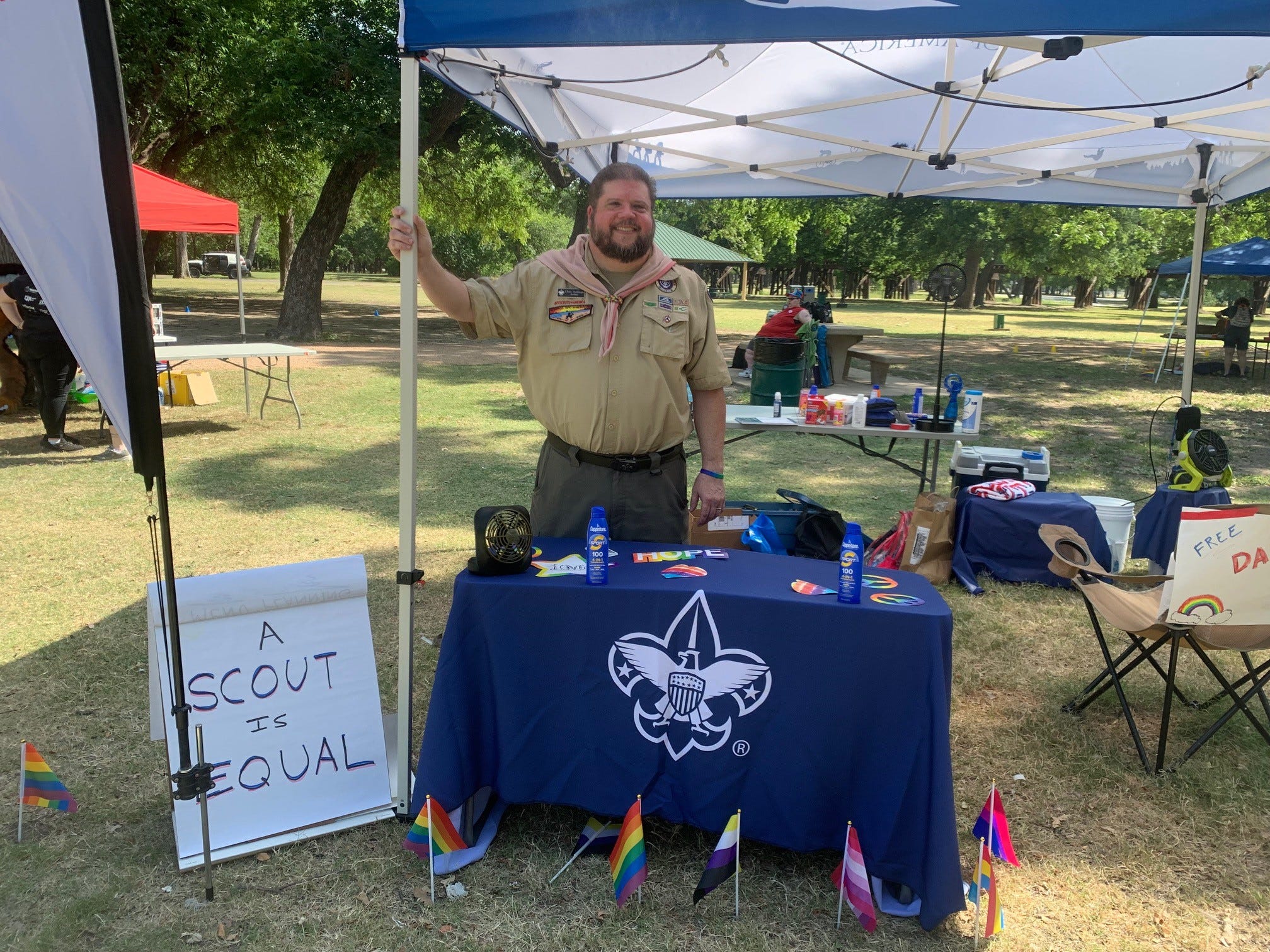
Mike De Socio: What were the first conversations like around starting an LGBTQ+ committee in Longhorn Council?
District committee member Chris Hoffman: To me, it's very important, anytime you're talking about LGBTQ issues, that on the outside, that seems like just a little niche. We could make a blanket statement and [it] would apply to everybody in that group. But it's such a diverse group in and of itself, that we realize the need to try and pull different viewpoints, different backgrounds, different thoughts, different perspectives together. … So we just started having discussions and brainstorming and trying to pull in other people, other other viewpoints, perspectives. I got my pastor involved, because he and his husband do a lot of LGBTQ awareness training within Tarrant County. So just, you know, trying to pull different viewpoints in and we went from there.
CEO and scout executive Wendy Shaw: Yeah, the thing I remember about that first conversation, Chris … is you either were wanting to or you already had made connections to do LGBTQ trainings at our University of Scouting.
Hoffman: I've been friends with Wendell Baker out in San Francisco for years, and so I've taken some of his course offerings online. And I did have a desire to bring some of that to Longhorn Council University of Scouting. And last year and this year, 2021 and 2022, I was the dean for the general studies area at our University of Scouting. And so I thought, “Okay, I have an opportunity to really bring in some of DEI-type training and really get the discussions going.”
Director of field service Scot Fuller: As Chris and I started talking, and talking about more of a public launch with University of Scouting, [we thought,] how can we get members of the community and experts in the community to be a part of it? And I know Chris reached out to LGBTQ Saves here in Fort Worth, and they helped and joined on our committee. And we talked to PFLAG and GSA and whatnot as well to be able to try to find not just allies, but members of the community to help support scouts here as well.
De Socio: So it sounds like training has been a big piece of it. Is that the main priority of the committee, or are there are other goals too?
Hoffman: Oh, I would say it's multiple things. The training … flowed most naturally because some of the people on our committee, really one, my pastor, and then two, Sharon Herrera, who's the executive director and founder of LGBTQ Saves, they both do LGBTQ awareness training in the area. And we're always willing to help out to talk with other people. Sharon has been our trainer at University of Scouting for the last two years. It was one of the things that members of the committee already were doing and already had to provide. And it just naturally fit into University of Scouting. So that's an area of focus for us, definitely.
But we've also worked hard to work with LGBTQ Saves, and to have a presence at Pride-type events in the area. I say Pride-type of events, there's been something that LGBTQ Saves does during Pride month, but there's a lot of other activities. And LGBTQ Saves works with youth ages 14-24 in the area, and their families. And so they provide a lot of services. And they were very open to having us there as a participant or leading a workshop or doing an activity or something like that. So that's been another area for us.
Fuller: Or passing sunscreen out to help support them.
Hoffman: Yes. And I think the other area of focus would be, just once people found out that there was this committee and that there are resources, they started asking a lot of questions. And those questions are still ongoing. You know, “How do I make this work with my unit,” or “Hey, my child has come out as nonbinary and their troop is not very welcoming. How do we navigate this?" What are the resources?” Things like that. And just getting the discussion going has been tremendous.
Shaw: From the staff point of view too, it's great when something comes to our attention, we can say here's a resource to help you. I don't know if Chris would like this analogy or not, but almost like a little commissioner group, to be that resource on this particular [thing] in this particular area, as opposed to the more general support that commissioners give to units.
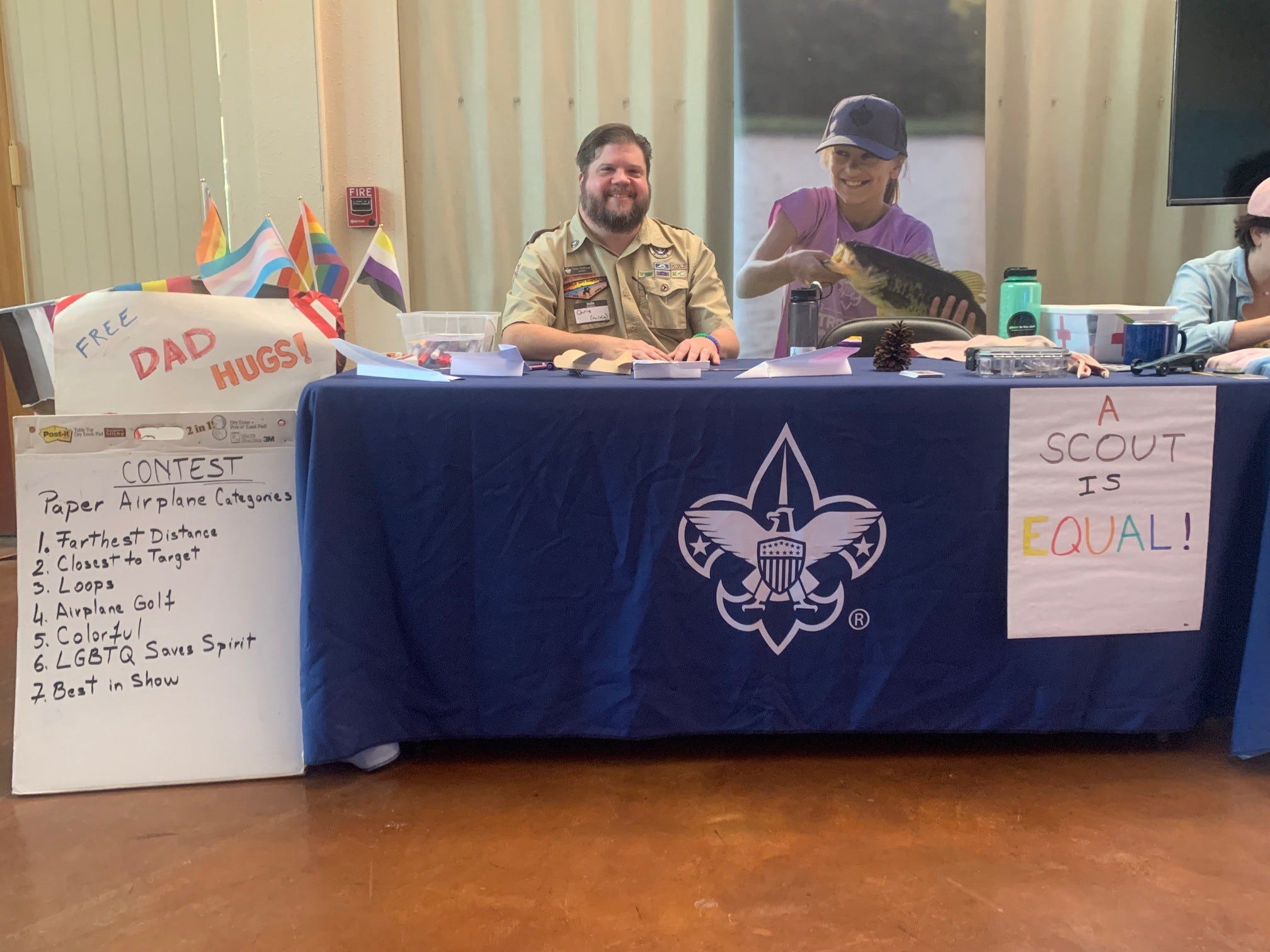
De Socio: Got it. And have you found that partnering with an organization like LGBTQ Saves is really essential to the work you’re doing?
Hoffman: To me, it's been essential having them as a partner, because we're able to get out and meet people in the communities where they are. And the others can speak to this much more than I can, but Longhorn Council has a very diverse group of different languages, different races, different cultures. And it's far too easy for us to say, well, we're Scouting, and we're just going to come tell you what you should be doing in your community. And to me, having someone who's already been in the community and has those connections, and is already out there doing things, and has the events there that we can just kind of plug in, has been beneficial.
Fuller: Not everybody's going to have a LGBTQ Saves in their community. But you know, reaching out to the GSA, they were in Austin, so that's another council here in Texas, but they were very welcoming and talked to us multiple times about what we can do to help support and work through them as well. And so I would say, just the GSA in general was very open to the idea. And they were excited to hear that the Scouts were reaching out to them to be able to find opportunities to support youth.
De Socio: Do you feel like this effort is also helping you reach new potential members, especially if you're getting out to these events that you normally wouldn't be at?
Hoffman: I would say absolutely. The feedback I've received at these events has been very positive. People were thrilled to know that Scouting is there. There are scouts and scouters, or former scouts, who are there and just talk about how pleased they are seeing that we're there.
And the other thing that we're dealing with in North Texas … there's a lot of opinions out there that LGBTQ and Scouting don't mix. … But still just having that connection, and another touch point, and just another place to see Scouting in a positive light, is important. And it's also nice having the recognition.
At one of the most recent events for LGBTQ Saves, somebody ended up getting into an ant bed outside, and they came in and they said, “Hey, I saw the Scout booth, do you have a first aid kit?” Well, yes, I do. And here's some after-bite, because I use it. And so just right away, you know, there was a sense of, we were prepared. We were there, and we were there to support everyone. So it was nice.
De Socio: I'm glad you brought up the environment that you're in. Because in Texas, but honestly I think everywhere now, it can be really touch and go. And people have a lot of opinions. Have you faced any real pushback to these efforts?
Hoffman: So I've been out there, I've gone to events, I've talked with some unit leaders on-on-one. I've gone to my district round table and let them know that we have this and that we have something called the relationship committees—and we have other people that we're trying to work with, making sure that there are connections with Catholic churches and Methodist churches, and with military and with veterans, and other groups as well, Hispanic and just other populations—and I've let them know that this exists. And I really haven't received a lot of pushback. I mean, I have some people that really just don't want to talk about it. But no one really coming out and attacking me and pushing back directly. So maybe some lack of support … but I wouldn't say anything directly, actively against me.
Now, I will say that our we've got a large council geographically. … We've focused a lot on Tarrant County, because we're right here. And we happen to know Tarrant County. … As we get farther out from Tarrant County, we have some committee members who are in other counties. And so we've talked with them about the situation in their county. For example, in Parker County, Weatherford, which is just west of us, I know the feelings and the attitudes are a little different there. So we haven't pushed there. You know, the thought is let's start where we can, where we can make a positive difference and where we can have an impact most readily.
De Socio: We're talking a lot about the LGBTQ+ community specifically, but is this part of a broader DEI effort on the council level?
Shaw: Yeah, that's a great question. I would describe our DEI approach as as one as simple as, we want to be welcoming. Like Chris, I don't necessarily get a lot of pushback. I might get questions, but I don't get pushback. And my response is, our our goal is to be welcoming. And very few people can argue with being welcoming. And so we haven't necessarily found the right DEI strategic approach. But I would say that, in general, more of our cultural approach of simply being welcoming is probably a stronger approach than any strategic effort or you know, any formal strategic plan bullet, or whatever else that you might work on.
De Socio: You all mentioned a few times now that people come to you with a lot of questions. What are some of the most common ones?
Shaw: I don't know that there is a common question. Chris referenced our relationship committees, and they exist because we do have lots of different members who belong to lots of different demographics. And so I think just like each person is unique, I think every situation is somewhat unique. So I don't know that there's more prevalent concerns, I think they're all very unique to the people and the communities and where they are.
I think what I continually see is that units want to find a way for young people to scout. And so, even if they've got questions, ultimately the goal is to find a way for young people to scout. And so if we can navigate some of the nuances of whatever it is that they're they're trying to do, that's everybody's goal. And that's what I see most often is, we all have the same goal, we're trying to make sure the young person can scout, or that we set them up for success in Scouting. But there isn't necessarily one answer or one theme.
De Socio: What's next for the LGBTQ committee?
Hoffman: While I am the volunteer chairing this committee, I really want to input from others. So I'm interested in seeing what other goals we come up with. And what these people are excited to work on. We had several different goals last year, and we just didn't have the time and people to work on all of them. And so I'm interested to see what we come up with this next year.
We're going to definitely increase our involvement with LGBTQ Saves. They have monthly meetings with youth, and monthly meetings with parents of youth. And one of the things that they've talked about internally is doing more life skills discussions. You know, how do you prepare a budget? How do you write checks? How do you exercise? How do you cook food? And through discussions, we've just realized that, oh my gosh, so many of these just fit so well into Scouting. And I talked with folks at the council office and different volunteers, and several people are excited about being able to go out and just put on a demonstration, put on a discussion, even if it's only a couple of times a year. So that's definitely something that we're going to be doing.
LGBTQ Saves does a youth specific Pride picnic every year. And that got us a lot of attention this last year, because we held a cooling station and had fans going and misters going and it ended up being about 104 [degrees] outside that day. It was very popular with all the youth, people would just talk with us and just standing under the the mist for a while to have a fan blow on them. And so we're planning on doing that again this year. And University of Scouting is going to be a big one for us as well.
De Socio: What’s your advice for other councils that are trying to create similar efforts around LGBTQ+ inclusion?
Fuller: My first gut reaction is, maybe it doesn't have to be similar. I liked what Chris talked about: We had a bunch of goals, we had a bunch of thoughts, but we can only start where we are. And that's the important thing is, let's start where you are, pick up something that you're passionate about, and start letting people know that we are here as a resource. We have a program that helps build confidence in individuals, and that's needed in the LGBTQ community just as much as is everywhere else. And we want you to start where you are, and provide resources where you are.
Shaw: I would say, keep it simple. I think for us, one of the ways that it's been successful is, there wasn't a big launch … it was organic in a lot of ways and has continued to be organic. And I think that's some of the success, is that it wasn't something that was forced or pushed or top-down. It was this great coming together of Chris, a passionate volunteer, and myself, but then letting it get legs all on its own.
Hoffman: The way I'd phrase it is that we focus on making progress, not necessarily on being perfect. And that kind of goes along too with the organic growth and just making progress where we can and recognizing that there's a great distance maybe between where we are and where we'd like to be. And we just have to make steps in the right direction.
And the other thing I would say is, don't try and do it all yourself. I think one of the reasons we are successful is we have so many people who are involved that get plugged in, and some of them are only able to attend committee meetings, or some of them are only able to help with one event a year, and that's fine.
